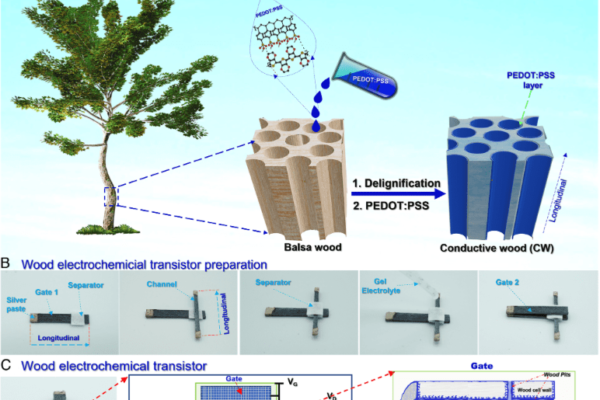In a groundbreaking development, scientists and researchers have achieved a significant milestone in electronics by creating the world’s first electrical transistor made of wood. This innovative breakthrough opens up new possibilities for wood-based electronics and holds the potential for regulating electronic plants and promoting sustainable technological advancements. Let’s delve into the details and explore the significance of this remarkable achievement.
On April 27, 2023, researchers announced the creation of an electrochemical transistor made from wood, marking a significant leap forward in electronics. This collaborative effort by scientists from Linköping University and the KTH Royal Institute of Technology in Sweden has paved the way for wood to become a viable material for electronic devices.
The research findings in the journal PNAS highlight the world’s first wooden transistor and its potential to revolutionise the electronics industry. The transistor, constructed using balsa wood, offers distinct advantages over conventional electronic components. Unlike previous wood-based transistors, it has demonstrated continuous functionality and the ability to regulate electricity flow without deteriorating. Moreover, this innovation opens up avenues for biodegradable applications and environmentally friendly electronic systems.
The wooden transistor operates on the principle of organic electrochemical transistors (OECTs), a technology known for its potential in biodegradable applications. By modifying wood with conductive polymers, such as PEDOT: PSS, scientists achieved an electrical conductivity of up to 69 Sm^-1, creating a transistor capable of modulating electrical currents in a porous and thick transistor channel. This breakthrough paved the way for the development of advanced wood-based electronics.

The potential applications of the wooden transistor are vast and promising. One significant area is the regulation of electronic plants, where this technology can play a pivotal role. Electronic plants refer to plants that are integrated with electronic components to monitor and control their growth and environmental interactions. The wood-based transistor offers an eco-friendly, biocompatible solution for seamlessly integrating electronics into plants.
Additionally, the wooden transistor holds the potential to revolutionise the electronics industry, offering sustainable alternatives to traditional transistors. Its continuous functionality, improved durability, and ability to regulate electricity flow makes it an attractive candidate for future electronic devices.
Developing an electrical transistor made of wood marks a significant advancement in electronics. This breakthrough achievement showcases the potential of wood-based electronics and offers sustainable and biodegradable alternatives to conventional electronic components. The ability to regulate electricity flow and the promise of integrating electronics into plants highlights the transformative impact of this innovation. As researchers continue to explore the possibilities, the wooden transistor represents a significant step towards a greener and more sustainable future for electronics.
Sources
- https://www.sciencedaily.com/releases/2023/04/230427114509.htm
- https://scitechdaily.com/scientists-develop-the-worlds-first-transistor-made-of-wood/
- https://spectrum.ieee.org/wood-transistor
- https://interestingengineering.com/innovation/worlds-first-electrical-wood-transistor
- https://www.pnas.org/doi/10.1073/pnas.2218380120
- https://www.forbesindia.com/article/lifes/a-transistor-made-of-wood-sign-of-a-future-revolution-in-materials/84779/1
- https://liu.se/en/news-item/varldens-forsta-tratransistor




